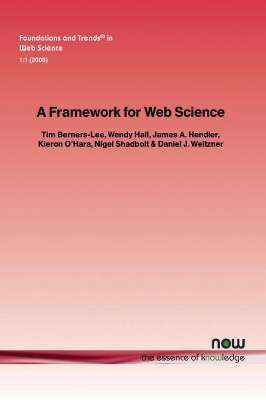Foundations and Trends (R) in Web Science
2 total works
Web Science
by Kieron Hara, Noshir S. Contractor, Wendy Hall, James A. Hendler, and Nigel Shadbolt
Published 18 December 2013
Understanding the Web is a problem on a par with other complex scientific challenges such as climate change or the human genome. The requirement for understanding should ideally be accompanied by some measure of control, which makes Web Science crucial in the future provision of tools for managing our...Read more
Understanding the Web is a problem on a par with other complex scientific challenges such as climate change or the human genome. The requirement for understanding should ideally be accompanied by some measure of control, which makes Web Science crucial in the future provision of tools for managing our interactions, our politics, our economics, our entertainment, and - not least - our knowledge and data sharing.
The Web is a critical infrastructure that underpins increasingly many of our transactions, and yet is barely understood by policymakers. This monograph considers the development of Web Science since the publication A Framework for Web Science (Berners-Lee et al., 2006). The theme of emergence is discussed as the characteristic phenomenon of web-scale applications, where many unrelated micro-level actions and decisions, uninformed by knowledge about the macro-level, still produce noticeable and coherent effects at the scale of the Web.
A model of emergence is mapped onto the multitheoretical multilevel (MTML) model of communication networks explained by Monge and Contractor (2003). Four specific types of theoretical problem are outlined. First, there is the need to explain local action. Second, the global patterns that form when local actions are repeated at scale have to be detected and understood. Third, those patterns feed back into the local, with intricate and often fleeting causal connections to be traced.
Finally, as Web Science is an engineering discipline, issues of control of this feedback must be addressed. The idea of a social machine is introduced, where networked interactions at scale can help to achieve goals for people and social groups in civic society; an important aim of Web Science is to understand how such networks can operate, and how they can control the effects they produce on their own environment. Web Science explains the motivating issues for Web Science. It shows not only how research has addressed the gap between the micro-level processes and the macro-level Web-scale phenomena to which they give rise but also why research is still needed to do that.
The Web is a critical infrastructure that underpins increasingly many of our transactions, and yet is barely understood by policymakers. This monograph considers the development of Web Science since the publication A Framework for Web Science (Berners-Lee et al., 2006). The theme of emergence is discussed as the characteristic phenomenon of web-scale applications, where many unrelated micro-level actions and decisions, uninformed by knowledge about the macro-level, still produce noticeable and coherent effects at the scale of the Web.
A model of emergence is mapped onto the multitheoretical multilevel (MTML) model of communication networks explained by Monge and Contractor (2003). Four specific types of theoretical problem are outlined. First, there is the need to explain local action. Second, the global patterns that form when local actions are repeated at scale have to be detected and understood. Third, those patterns feed back into the local, with intricate and often fleeting causal connections to be traced.
Finally, as Web Science is an engineering discipline, issues of control of this feedback must be addressed. The idea of a social machine is introduced, where networked interactions at scale can help to achieve goals for people and social groups in civic society; an important aim of Web Science is to understand how such networks can operate, and how they can control the effects they produce on their own environment. Web Science explains the motivating issues for Web Science. It shows not only how research has addressed the gap between the micro-level processes and the macro-level Web-scale phenomena to which they give rise but also why research is still needed to do that.
A Framework for Web Science
by Tim Berners-Lee, Wendy Hall, James A. Hendler, Kieron Hara, Nigel Shadbolt, and Daniel J Weitzner
Published 20 September 2006
A Framework for Web Science sets out a series of approaches to the analysis and synthesis of the World Wide Web, and other web-like information structures. A comprehensive set of research questions is outlined, together with a sub-disciplinary breakdown, emphasising the multi-faceted nature of the Web, and the multi-disciplinary...Read more
A Framework for Web Science sets out a series of approaches to the analysis and synthesis of the World Wide Web, and other web-like information structures. A comprehensive set of research questions is outlined, together with a sub-disciplinary breakdown, emphasising the multi-faceted nature of the Web, and the multi-disciplinary nature of its study and development. These questions and approaches together set out an agenda for Web Science, the science of decentralised information systems. Web Science is required both as a way to understand the Web, and as a way to focus its development on key communicational and representational requirements.
The authors survey central engineering issues, such as the development of the Semantic Web, Web services and P2P. Analytic approaches to discover the Web's topology, or its graph-like structures, are examined. Finally, the Web as a technology is essentially socially embedded; therefore various issues and requirements for Web use and governance are also reviewed. It is aimed primarily at researchers and developers in the area of Web-based knowledge management and information retrieval. It will also be an invaluable reference for students in computer science at the postgraduate level, academics and industrial practitioners.
The authors survey central engineering issues, such as the development of the Semantic Web, Web services and P2P. Analytic approaches to discover the Web's topology, or its graph-like structures, are examined. Finally, the Web as a technology is essentially socially embedded; therefore various issues and requirements for Web use and governance are also reviewed. It is aimed primarily at researchers and developers in the area of Web-based knowledge management and information retrieval. It will also be an invaluable reference for students in computer science at the postgraduate level, academics and industrial practitioners.

